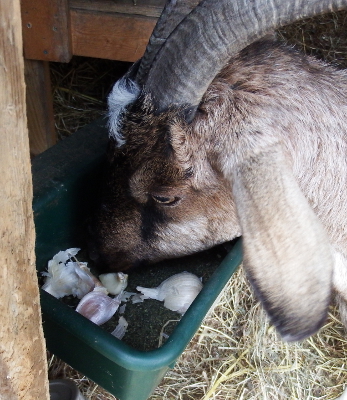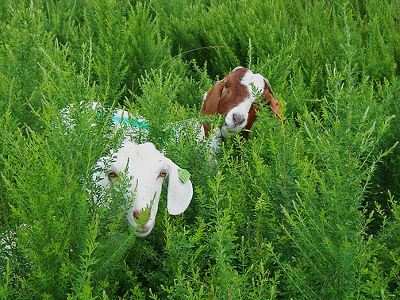
The science behind non-chemical dewormers of goats and sheep
 The afternoon session of the Master Shepherd course we attended was
led by Dahlia O'Brien and covered sheep and goat parasite management
from a scientific perspective. Predictably, there was a lot of talk of
chemical dewormers, but the most valuable section to me was her input on
less mainstream techniques for keeping parasite loads low in your
caprine and ovine herds.
The afternoon session of the Master Shepherd course we attended was
led by Dahlia O'Brien and covered sheep and goat parasite management
from a scientific perspective. Predictably, there was a lot of talk of
chemical dewormers, but the most valuable section to me was her input on
less mainstream techniques for keeping parasite loads low in your
caprine and ovine herds.
I didn't take many notes
on the management section since this is all data the biological farmer
likely has under her belt (whether or not she's able to implement it on
her own farm). Don't overstock. Do keep your animals healthy by feeding
them appropriately. Don't let your animals eat or drink poop. Don't
graze pasture plants closer than two inches to the ground. Try to rotate
pastures in such a way that you keep parasite loads low (moving animals
after four or five days on pasture and not returning them to the same
spot for sixty days).
More interesting to me
was Dr. O'Brien's take on which herbal and non-mainstream dewormers
work. Basically, she said there's no scientific data that garlic,
papaya, pumpkin seeds, ginger, wormwood, fennel, purchased herbal
mixtures, or diatomaceous earth work at controlling goat and sheep
intestinal parasites. She admitted that the herbs may help boost animal
immune systems so they can better fight off the invaders, but she
doesn't recommend counting on herbs as a first or even second line of
defense. (Diatomaceous earth didn't even make the cut for the
overall-health-improvement category --- it's only been shown to work as
an insecticide.)
On the other hand, O'Brien wasn't all chemicals all the way. Instead, she recommended copper oxide wire particles (COWP or copper boluses),
which she says are much safer than copper sulfate and which studies
have suggested have a significant impact on lowering loads of barberpole
worms. She recommends treating goat kids at weaning age (which is a
dangerous time for worm infestations) with 0.5 grams and treating
older animals up to four times per grazing season with 1 to 2 grams.
Never treat more often than once every six weeks, and assess your area's
soil copper levels before treating sheep.
 Another
supplement that has been scientifically tested and proven to reduce
parasite levels in goats and sheep is the condensed tannins found in
lespedeza clover (Sericea lespedeza).
Forage chicory has also been reported to contain similar condensed
tannins that have reduced parasite problems in one trial with lambs.
We'll definitely be looking for seeds to incorporate these plants into
our pastures and surrounding areas in the near future.
Another
supplement that has been scientifically tested and proven to reduce
parasite levels in goats and sheep is the condensed tannins found in
lespedeza clover (Sericea lespedeza).
Forage chicory has also been reported to contain similar condensed
tannins that have reduced parasite problems in one trial with lambs.
We'll definitely be looking for seeds to incorporate these plants into
our pastures and surrounding areas in the near future.
Want more info on non-chemical goat and sheep parasite control? Wormx.info won Dr. O'Brien's seal of approval for containing tried and true information. The site is also, non-coincidentally, the source of the second photo in this post.
Want more in-depth information? Browse through our books.
Or explore more posts by date or by subject.
About us: Anna Hess and Mark Hamilton spent over a decade living self-sufficiently in the mountains of Virginia before moving north to start over from scratch in the foothills of Ohio. They've experimented with permaculture, no-till gardening, trailersteading, home-based microbusinesses and much more, writing about their adventures in both blogs and books.
Want to be notified when new comments are posted on this page? Click on the RSS button after you add a comment to subscribe to the comment feed, or simply check the box beside "email replies to me" while writing your comment.

Hi Anna and Mark,
Your article about dewormers refers to a number of 'scientific' studies.
Perhaps I 'should' 'respect' scientific 'research'. That said, it seems to me that to quote Henry Ford: "The thing of supreme importance is experience."
I have been reading and re-reading Newman Turner and Dr. Wrench's 'Wheel of Health'.
The message I keep learning is that if I eat healthy alive food. I will have a vibrant and healthy life. The parasites, etc. will take care of themselves. And once my body is done with them, they will leave by themselves.
Since I have quite a few MDs in my family this leads to some heated lectures, even diatribes
I especially liked the recent comments in response to your article about herbs.
Together with the articles I mentioned above, I used garlic [ which i do not like ] to cure a very bad cold without the usual anit-biotic method.